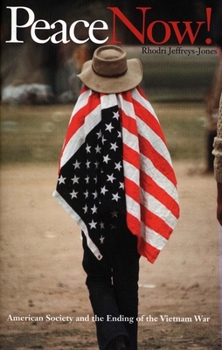Peace Now!: American Society and the Ending of the Vietnam War
Select Format
Select Condition 
Book Overview
How did the protests and support of ordinary American citizens affect their country's participation in the Vietnam War? This engrossing book focuses on four social groups that achieved political prominence in the 1960s and early 1970s--students, African Americans, women, and labor--and investigates the impact of each on American foreign policy during the war. Drawing on oral histories, personal interviews, and a broad range of archival sources, Rhodri Jeffreys-Jones narrates and compares the activities of these groups. He shows that all of them gave the war solid support at its outset and offers a new perspective on this, arguing that these "outsider" social groups were tempted to conform with foreign policy goals as a means to social and political acceptance. But in due course students, African Americans, and then women turned away from temptation and mounted spectacular revolts against the war, with a cumulative effect that sapped the resistance of government policymakers. Organized labor, however, supported the war until almost the end. Jeffreys-Jones shows that this gave President Nixon his opportunity to speak of the "great silent majority" of American citizens who were in favor of the war. Because labor continued to be receptive to overtures from the White House, peace did not come quickly.
Format:Paperback
Language:English
ISBN:0300089201
ISBN13:9780300089202
Release Date:April 2001
Publisher:Yale University Press
Length:320 Pages
Weight:0.78 lbs.
Dimensions:0.9" x 5.0" x 8.0"
Related Subjects
20th Century Asia History Military Politics & Government Politics & Social Sciences Vietnam WarCustomer Reviews
1 rating
Compelling interpretation of the end of the Vietnman War....
Published by Thriftbooks.com User , 25 years ago
The desires and motives of four social groups are examined herein. The author makes a compelling case for the serial nature of these groups' revolt against the war, and their resultant affect on the US withdrawl from the war.






